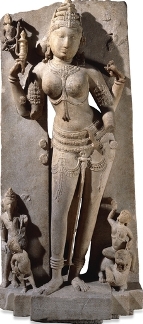The legend of bhavAnI having blessed the cHatrapati founder of hindU svarAjya with her own khaDga for smiting the turuShka-s, is all too famous. So we have the bhAkars mentioning about the miraculous sword, and we have contemporary bhUShaNa telling us about it. But the fame of the khaDga was known far and wide, and it seems used to even awe the hearts of his enemies.
Thus we have the contemporary Italian mercenary and freebooter Manuzzi telling us about his having once witnessed the abhimantrita maharaTTA sword. In his Storia do Mogor he records that on one occasion he led a diplomatic mission on behalf of awrangzib and his portuguese allies to negotiate the terms of truce with shambhAjI and the rebellious son of awrangzib who was in shambhAjI’s safe custody. (shambhAjI introduced to Manuzzi durgAdAsa the famous rAThora general in disguise as prince Akbar.) During the visit he once requested shambhAjI whether the latter could show him but once the famous divine sword that his father had, and shambhAjI would let him see from far just one flash of it.
The hindu revival in the founding of the maharaTTA empire had for its foundation its predecessor, the great vijayanagara. the footprint of vijayanagara are visible in the resurgent maharaTTA-s in many ways: the legend pf jagadambA appearing before the valiant warrior-king and offering him her own khaDga to destroy the enemy being also one. Thus we read the princess-poetess ga~NgAdevI describing in fourteenth century how the Goddess from madurai appeared to her husband yuvarAja kampanarAya, son of the founder of the empire bukkArAya, and gave him her sword to go out and thrash away the sultanate of the islamite tyrants from the draviDa lands. The princess describes at length in madhurAvijaya the glory of this sword and how it originally belonged to mahAdeva, was given by sage agastya to various kings, and finally is being trusted by bhavAnI to the worthy arms of the vijayanagara.
It is of course very frequent throughout the hindU itihAsa-s and purANa-s for worthy warriors to acquire divine shastra-s from the deva-s. Thus in padma purANa we have rAma getting the dhanuSha from mahAdeva, and rAvaNa had received before His sword. mahAbhArata is of course full of description of such arms which can fill reams.
But this had continued down to the later historical times, even before vijayanagara, that we read about bhavAnI’s or mahAdeva’s sword. Thus we read in the histories of nAthayogI-s that the famous nAtha siddha delivered the divine sword of bhavAnI and mahAdeva to a rAjapUta named kAlabhoja who founded the house of mevADa.
Later in the eighteenth century, we similarly hear of the famed bhavAnI sword having been acquired by blessed pR^ithvI nArAyaNa shaAha who went on to found the now abolished hindU svArAjya in nepAla country. We have had multiple occasions to be at this shaktipItha on the borders of nepAla, where young pR^ithvI nArAyaNa performed his arduous tapas and finally received the anugraha of devI.
That reminds us of our childhood chahamAna friend, now settled at this place, who would often tell us about a khaDga of bhavAnI also having been given to the chahamAna-s, and that his family was in possession of the sword. Their family would even now perform the ritual shastrapUjA on the vijayadashamI day when every adult (male and female) of his clan would perform their own symbolic bali before devI and offer their own blood at its blade. We would of course be denied access to see it.
Until last, when we did get to witness the rAjapUta sword of bhavAnI. On its golden hilt is inscribed some mantra in devanAgarI text, now hardly legible, but we guess it is from atharvan veda… and its blade is graced by the image of raNodyata kAlI…




